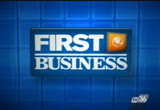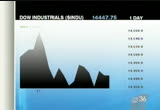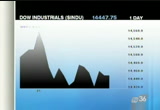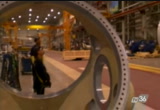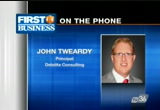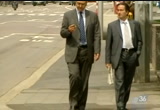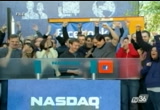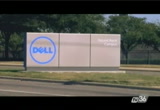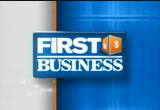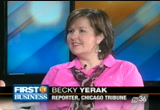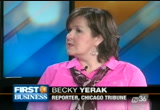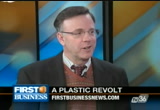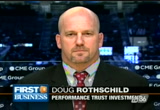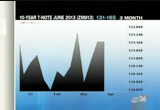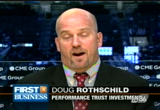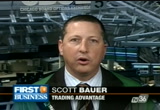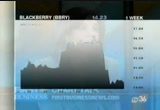tv First Business KICU March 26, 2013 4:00am-4:30am PDT
4:00 am
news out of cyprus throws the stock market into a tizzy. in today's cover story, is outsourcing over? new signs u.s. companies are keeping jobs close to home. plus, is plastic losing its power? why younger generations are steering clear of credit cards. and, three ways bond traders are making money. first business starts now. you're watching first business: financial news, analysis, and today's investment ideas. good morning. it's tuesday, march 26th. i'm angela miles. in today's first look: stocks on a roller coaster ride: the dow ticked up to a record high early in yesterday's session on word a bailout deal would rescue cyprus. then worries surfaced about what the deal would mean
4:01 am
for banks, sending the blue chips down 117 points to end the day with a 64-point loss. what a day. a new report shows coal consumption could rise higher this and next year due to strong demand. and a tweet moves tesla stock. late in the session, the co- founder tweeted something really exciting will be announced thursday, driving the stock up to $37. matt shapiro, president of mws capital, joins us on the show this tuesday morning to take a closer look at the markets. matt, i have to ask, is the party over? people are getting so negative all of a sudden. > > you mean because the market went down yesterday? > that's all it did. > > it's funny. the market doesn't go down very much, and when it does, people are ready to abandon ship, and it shows you, even though valuations are low, there is still a lot more room to go higher. but, it does say that the market is not just going to reward low valuations. we need continued economic progress, continued good
4:02 am
earnings. and i do look for that in the second half of the year. yesterday i think the market just lost its nerve, especially with the stuff going on in cyprus and the eurozone. there have been a couple misses in earnings last week, especially oracle and fedex, that got some investors worried. > what goes through your mind as you see a day like yesterday though? news coming in from cyprus - is it news or is it noise to you? > > for me it is noise, angie. i am very confident in our investments and that the market is going to go higher. for the most part, it was kind of a mixed bag - up in the morning, down. just a typical nervous trading day. i would like to see the market gather itself a little bit as we end the quarter on friday with some window dressing. managers are going to be getting into stocks that they want to show as favorites on their investment holdings. > with passover underway, do you suspect there will be any change
4:03 am
in trading volumes on the trading floors? > > i think more muted. being jewish myself, i think a lot of jewish traders and investors take yom kippur and rosh hashanah off a little bit more than passover, so i think there is going to be active trading again. again, being realistic, the market is not going to go straight up. we are going to have bad days here and there. > could be a big short week. good to have you on the show. thank you matt. > > thanks a lot. there's a growing sentiment among companies that outsource a portion of their work - they don't want to be tied to long contracts if the work isn't meeting benchmarks. in our cover story, the undercurrent beneath outsourcing and how it may affect whether jobs are done in-house. a survey by deloitte consulting found companies are seeking more options in outsourcing. in fact, among more than 100
4:04 am
companies in 22 industries, nearly half of them said they'd terminated an outsourcing contract early. "we're not seeing five-, seven-, ten-year contracts, we're seeing 2- and 3-year agreements that are more flexible from the buyer's side." there were principally three reasons behind insourcing: first, to improve customer service; second, to regain control over job functions outsourced; and third, to reduce costs. companies found outsourcing not exactly the bargain they'd expected. "it's now more cost-efficient to think about expanding in the u.s., and lo and behold, that's what's happening." outsourcing does not necessarily mean overseas - deloitte is finding in some cases, outsourcing has meant bringing work from companies in expensive-to-live areas such as new york's tri-state or san francisco's bay area to america between the coasts. "we're seeing 'clusters-of- excellence' in rural communities that are not as cheap as traditional offshoring but that provide a viable alternative." hiring managers translate the trend as an opportunity, particularly for those who saw layoffs and wages fall
4:05 am
during the recession. "what they're realizing is that they can get employees for less than before, pay them fewer benefits and have a transitional workforce." deloitte predicts the duration of outsourcing contracts will continue to shorten as companies try to keep open as many options as possible. in cyprus, all banks will remain closed until thursday. a $13- billion eurozone bailout deal to spare cyprus from a meltdown calls for restructuring of the country's largest banks and downsizing of the nation's banking sector. controls will be in place to prevent a run on the banks, and bank deposits larger than 100,000 euros will be subject to a levy. u.s. automakers are coming to the aid of the motor city with a bailout deal on wheels. chrysler, ford and general
4:06 am
motors, along with other michigan companies, are donating $8 million for desperately needed police and ambulance vehicles. detroit's finances are now under the control of emergency financial manager kevyn orr. he is tasked with reigning in budget deficits that reach into the billions. china may soon resume handing out subsidies to people who buy electric cars. a couple of years ago, several cities, including beijing, began offering nearly $10,000 to electric car buyers. the deal ended in 2012, but it never really caught on due to the lack of charging stations and high battery costs. the chairman of byd, which is building the plug- in cars with daimler, expects the subsidies could happen in april or may as china attempts to curb pollution. byd is backed backed by billionaire warren buffett. new york city mayor michael bloomberg is planning a $12- million tv ad blitz to push for new gun legislation. the specific audience bloomberg wants to reach are senators in 13 states in advance of an upcoming vote on gun reform
4:07 am
legislation. he cites national polls that show a vast majority of americans want new legislation. he spoke at an event recently along with vice president joe biden. "if congress does nothing, another 12,000 people will be murdered with guns this year alone." nra president wayne lapierre says bloomberg is "reckless" in his comments on gun issues, and the nra will match his spending dollar-for-dollar with its own anti-legislation ads. the sec is giving the go-ahead to nasdaq's plan to pay customers for losses from facebook's botched ipo. brokers will recieve $62-million. but that's not even close to the $500 million people on wall street estimate was lost on social media's opening day of trade. nasdaq will pay in cash. the deal with the sec leaves the door open to future lawsuits. a report next month is expected to reveal how the so called "patent cliff" is affecting drug companies. the patent cliff refers to patents ending for drug companies, opening the way for others to send generic
4:08 am
versions onto the market. the new york times reports drug costs fell slightly in 2012, mostly because of generics. it's the first decline in half a century. a new survey shows how far employers will go to save money on employee healthcare. human resources consulting firm aon hewitt says a growing number penalize workers who don't make healthy choices. a survey found 83% use an incentive program. 79% of those offer rewards, but 5% penalize employees who don't make changes. 16% use a combination of both. well-known hedge funds are duking it out over dell. the tech company's board believes the bidding war could end with a proposal topliing founder michael dell. investor carl icahn is offering $15 a share. he holds a 4.6% stake in the company. private equity fund blackstone group is offering $14.25 a share. michael dell initially offered $13.65 per share to go private. dell closed monday at $14.51
4:09 am
best buy's founder is back on the board. richard schulze will return to best buy as chairman emeritus. schulze says he is coming back to "support the initiatives" of current ceo hubert joly. joly took over last july after schulze left the company. since then, schulze missed a window to purchase best buy, and, under joly's leadership, the company has seen positive results. two silicon valley startups are headed for the big-time. yahoo has just acquired the mobile app "summly," which provides users with summaries of news stories, breaking them down to just 400 words. summly's founder is only 17 years old, and reportedly $30 million richer after selling his tech company. meanwhile, apple has bought wifi-slam. that app markets itself as an "indoor gps." the wall street journal says apple spent about $20 million on the deal. t-mobile is expected to go contract-free today. it's a
4:10 am
challenge to traditional plans that generally require a two- year committment. t-mobile also does not subsidize new devices, which is typical of large carriers. t-mobile is the nation's fourth largest wirless phone company. rules on electronics may soon get more lax in the skies. reports say the faa is considering allowing use of electronics during takeoffs and landings. instead of turning gadgets off, flyers would be able to use tablets and other electronics by putting them in airplane mode. the rule would not include cell phones. boeing is launching test flights this week with its dreamliners. yesterday a 787 took off for a two-hour flight. the jet maker is trying out new lithium ion batteries on board. data from monday's flight as well as future flights will be submitted to regulators. the faa grounded the aircraft back in january after the batteries overheated on two separate jets. the chicago tribune reports boeing is losing $50 million per week as dreamliners sit on the ground. refund realities. american express finds fewer taxpayers expect refund checks this year.
4:11 am
only 59% think the "check's in the mail," down from 64% in 2012. 19% say they will owe the government cash, up from 13% last year. the study also found more americans who do get a refund plan to use it to pay down debt or put money into savings. still to come, with interest rates at record lows, how traders are making money in the bond market. that's later on. but first, some younger shoppers are evolving past credit cards. could the lack of plastic hurt their financial future? that's next with bill moller.
4:14 am
now this is surprising. when a late teen to early-20-year olds whip out plastic these days, chances are it's not a credit card they're using. debit card, maybe, but certainly not a credit card. a sallie mae ipsos survey found about 50% of 18- to 24-year-olds own a credit card in 2010, and last year it was down to about 40%. let's talk with chicago tribune business reporter becky yerak. i know that it wasn't that many years ago that college kids would go to orientation day, and they'd be thrown t-shirts and credit cards. credit card companies knew to get them early, and they were aggressively pursuing them on college campuses. > > there was a big change
4:15 am
because of a 2009 law, and it affected everybody who really has a credit card, regarding fees, interest rates... but two of the things that it did, it really curbed marketing to kids - for example, credit card companies can no longer go to a campus and give out little gifts to try to entice students to sign up for credit cards -; also, credit card companies and universities have to disclose these agreements. so colleges have to say how much they are getting in fees from these credit card companies for the right to let them on the campus. so both of these things have kind of combined. > so that is the supply side. but also from the consumer side, young people aren't as apt to want a credit card, too, because, i guess, they have seen how you can so easily get burned. > > they have probably seen their parents get burned, and also the job market is still really dismal, so they are reluctant to put things on charge cards, where, in the past, with a better job market, they might have. > all right. fewer young people using credit cards. what is the
4:16 am
economic or market impact of this? > > if they don't establish credit, it may be harder down the road to buy a house or buy a car, so they really do need a credit card. also, this could have implications for the economy, because 2/3 of the economy is based on consumer spending, and if people aren't buying cars or homes, that could have an impact. > the credit industry is trying to get around this. young people need credit, and they have come up with some alternative means to do that. > > one of the biggest credit bureaus, experian - they are one of the three big ones - they are starting to factor in things like rent payment, so even if people don't have credit cards, this is one of the alternative ways that people's credit-worthiness is being assessed. > becky yerak from the chicago tribune. thanks so much. > > thank you. thank you bill. still ahead, a bond bonanza. from what you can expect out of the bond market in the second quarter to what bonds are telling us about the economy,l it's all after the break.
4:21 am
similar to stocks, the bond market has been riding the ups and downs of news out of cyprus. doug rothschild, president of performance trust investment advisors, is here to do some bonding with us this morning. good to have you on the show. > > good to be here. thanks for having me. > i know people have long been waiting for this grand rotation out of stocks into bonds. is there any sign out there that could happen anytime soon? i'm
4:22 am
guessing no. > > i'm not seeing it. i am actually seeing the opposite: institutional investors are moving into stocks and out of bonds, because dispersion has been back into the market, so there are better opportunities in stocks at a lower volatility than we have had. the vix, which is a measure of implied volatility, is down near 13%. it hasn't been this low in 5+ years - actually, before the credit crisis of '08. > is the bond market telling us anything at all about the overall economy? > > the traditional indicators you would look for are hard to see and recognize any patterns, because we are really in uncharted territory. the federal government is driving this bus. they are the engine that is moving this economy. they are telling you if you have got money in a savings account, you are going to earn zero. so if you want to make money, you've got to go buy a home, you've got to go invest in the stock market. you have to go take risk. so the traditional things you see in the markets, it's much harder to measure in terms of where you place your money. > i know you bond traders are
4:23 am
pretty smart and crafty out there though, so where are some places to make some money? i know municipal bonds, the munis, have been very popular of late. is that still going on? > > it is, and it is a good opportunity. you have three places in fixed income - a $37- trillion market - where you can earn above 3%. 90% of a $37- trillion market is yielding below 3%. the three places you can go and earn better than 3% are non-agency mortgage-backed securities, high-yield, and municipal bonds. and as you mentioned, munis are a good place to go, because if you are a taxable investor, if you go out the credit curve just a little bit - single-a, double- a, where you still have default rates better than triple-a corporates, you can get a 3- to 3.5% tax-exempt yield, which comes out about 5% tax- equivalent yield, which is pretty good. > doug rothschild, it was great to have you on the show. we'll have you back soon. > > thank you. > thank you! comingup, how options players are connecting to the trade on blackberry. that's next in chart talk.
4:27 am
scott bauer of trading advantage joins us now for chart talk. always good to have you on the show. let's start by looking at blackberry. the stock was down significantly at one point yesterday off of some downgrades. people are very troubled about this launch of the new phone coming on. what do you think? this is a classic case of buy- the-rumor, sell-the-news. everything leading up at the end of last week to this launch looked like blackberry maybe was going to trade in the $20s even - i mean, the upgrades, the interest from the marketplace, the interest in the option market was unreal. and then, i will tell you what angie, on friday, last friday, all of a sudden, we saw a lot of put buyers come into the marketplace, and a lot of put buyers looking at the downside weekly puts that expire at the end of this week. and lo and behold, the $14 strike was the big one. we traded down to,
4:28 am
what, $13.20 yesterday? and now goldman came out and downgraded the stock. earnings come out thursday, going into the long weekend. volatility on the options are through the roof. it is anyone's guess here. > so what would be your trader play on this? > > if anything i would probably want to do some spreads, some time spreads. maybe the at-the-moneys, a $14- or a $15-strike, because extreme, extreme volatility in this weekly option has got this so overpriced in comparison to actually some of the weeklies two weeks out or even the monthly in april. i would probably just buy a time spread, because, you know what, this stock could easily go to $10, it could easily go to $18. > so you just want to make some money no matter where the stock moves. and i want to mention humana, because people have made a lot of money on the so- called obamacare stocks, but what is happening with humana now? > > humana is unlike many of the other insurers, because this one is tied most to insurance premiums that everyone is talking about maybe rising due to obamacare. so just over the
4:29 am
last week or so, we have seen huge, huge put buyers down on the $65-strike line. and that's for april expiration. the interesting thing is, humana's earnings don't come out until the end of the month, so actually in the may cycle. but people are really expecting a big move, maybe over the next couple of weeks due to this obamacare. > thank you for the info scott. > > thank you, angie. have a great day. that's it for now. coming up tomorrow, why commercial jingle writers are in demand. on that note, from all of us at first business, thanks for watching, and have a great tuesday!
140 Views
1 Favorite
IN COLLECTIONS
KICU Television Archive
Television Archive  Television Archive News Search Service
Television Archive News Search Service 
Uploaded by TV Archive on

 Live Music Archive
Live Music Archive Librivox Free Audio
Librivox Free Audio Metropolitan Museum
Metropolitan Museum Cleveland Museum of Art
Cleveland Museum of Art Internet Arcade
Internet Arcade Console Living Room
Console Living Room Books to Borrow
Books to Borrow Open Library
Open Library TV News
TV News Understanding 9/11
Understanding 9/11
